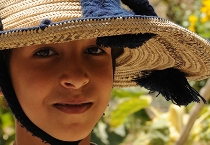Morocco

In Morocco, the WEPS project is implemented in collaboration with the Ministry of Agriculture, Fisheries, Rural Development, Water and Forests and is guided by the multidisciplinary team of the water scarcity initiative that gather key stakeholders interested in water issues (see country team and partners).
Background
Morocco, a North West African country on the Mediterranean Coast host 33 million inhabitants. The cultivated area (annual and permanent crops) is estimated at 9.4 million hectares in 2012. The forest estate covers 9 million hectares, of which around 5.1 million hectares are forested. Agriculture share in GDP represents 14.6 percent of total GDP in 2012. However, its contribution to GDP and the GDP itself suffered significant fluctuations due to climatic hazards. The agricultural sector contributes to exports up to 10.5 percent and rural incomes up to 65 percent. It employs 23.5 percent of the active population at the national level, but it remains dominant in rural areas where the share of the active population not in farming is still very low.
Water plays a critical role to cope with variability and scarcity. The total renewable water resources are estimated to be 29 km3/year with 2/3 surface water –irregularly distributed on the territory- and 1/3 groundwater. Only 22 km2/year are considered technically manageable. In 2010, water withdrawals amounted to 10,580 million m3 of which 2,322 million m3 of groundwater, 7 million m3 of desalinated water and 8,251 million m3 of surface water, to which must be added 70 million m3 of treated wastewater used directly. However, the water demands for the year 2010 amounted to 14,649 million m3, of which 90 percent for irrigation. The confrontation between water resources mobilized and the water demands of the different sectors shows that the needs are not met and that there is a water deficit that is partially covered by groundwater over-exploitation. In particular, irrigation water needs are not completely satisfied, thus reducing agricultural production in the areas equipped.
In 2017, within the framework of the joint program of the FAO and the Moroccan government piloted the Sustainable food and Agriculture framework" (SFA). The SFA-Morocco diagnostic study, validated and published in 2017, identified priority issues/objectives for the sustainability of agriculture in Morocco. A downscaling of the analysis was done at regional level in Souss-Massa that enabled to gather field evidence on some of the key issues identified. The dialogue organized on October 31, 2017 debated the preliminary elements of a study commissioned to a national team to check the policies and their instruments from the point of view of their combined effects on water. Among the recommendations were the importance to assess the sustainability of the water use in agriculture in the framework of a Nexus analysis, assess the reality of groundwater exploitation and the sectors of use.
